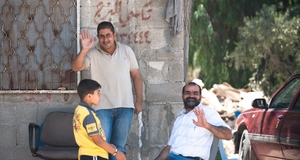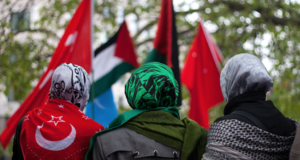Featured Opinion:The Right of Return: An Obstacle on the Road to Peaceful Negotiations Between Israel and PalestineAs seen by the Palestinian uprising of 2000 resorting to violence has historically been one of the Palestinians’ preferred methods to counteract Israel’s policies of colonialism (Rabinowitz 495). Fortunately, Palestinian civilians and leaders have recently changed their strategy for change to promote local civil society, increase the involvement of the international community, and establish a coalition between the competing political parties, Hamas and Fatah. The strongest example of grassroots activism in the OPT is the Boycott, Divestment, and Sanctions Movement (BDS) (Farsakh 62). The BDS Movement defends the claims of Palestinians, boycotts Israeli goods, and draws similarities between Israel and the South African apartheid government (Abunimah “Toward” and “Recognizing”). These steps are intended to isolate Israel and draw attention to the plight of Palestinians (Abunimah “Recognizing”). However, the level of economic isolation is most likely very limited, thus a more political and bilateral solution would prove more effective. Unfortunately, the leaders of the OPT are also overlooking this reality and are struggling to utilize the international community through the UN, rather than directly engage with Israel. In September, the UN will vote on a resolution that will recognize the State of Palestine as a member (Abunimah “Recognizing;” Bronner). In the words of a Palestinian leader, the objective of this move is to put Israel in a situation where she is “in daily violation of the rights of a fellow member state and diplomatic and legal consequences could follow” (Abunimah “Recognizing”). The Palestinian’s optimism is surprising because Israel does not have a history of respecting UN membership as a justification for non-occupation, as seen by the presence of Israeli troops in Lebanon from 1978-2000 (Abunimah “Recognizing”). Additionally, Israel responded to the announcement of this political move with violence (“News Agency”). Thus, although this is a very innovative political solution, it is unlikely to represent a peaceful or effective solution.The recent signal for the collaboration between Palestinian political parties, Hamas and Fatah, will also harm chances at achieving a solution (“Fatah”). While Fatah is often recognized as a political organization, Israel and the United States label Hamas as a terrorist group (“Fatah”). This has dramatic implications for a solution because, as Israel’s prime minister has stated, it is impossible to have peace with Hamas and Israel (“Fatah”). This recent change coupled with the release of the “Palestinian Papers,” will increase the adamancy of Palestinian leaders regarding the ROR. The “Palestinian Papers” are internal documents relating to negotiations between the Israelis and Palestinians that were recently released by Al Jazeera (Keinon “Analysis”). The papers demonstrate that Fatah was becoming more willing to act conciliatory towards Israel and recognized that “it is illogical to ask Israel to take five million [refugees]” (Al-Arian; Keinon “Analysis” and “Abbas”). On the other hand, Hamas has maintained a very harsh policy towards Israel and rejects compromises on the ROR (Abu Toameh). The combination of cooperating with an extremist group and fearing a backlash for recognizing the impossibility of the ROR has resulted in Fatah denying the statements and continuing its support for the ROR. Unfortunately and dangerously, if the ROR is perquisite for a solution, a solution will never be reached; the reasons for this reality can be observed in the domestic impact of the ROR in Israel. Domestic and International ImplicationsAs mentioned, Israel was founded to be a Jewish state (AbuZayaad 9; Cole 9). This purpose has impacted the national identity of the Israelis who now refuse to become a minority at the risk of losing the “Jewishness” of Israel. This anxiety is embodied in the government’s reiteration that one of its main objectives is to protect Israel’s Jewish character by ensuring that most Israelis are Jewish (AbuZayaad 9). Beyond maintaining that the majority of the population is Jewish, the Israeli government has (incorrectly) repeated that “Israel consists only and merely of Jews” (Korkut). The insinuation of claims like this is that non-Jews are not welcome because their presence will ruin the notion of a Jewish Israel (AbuZayaad 9; Cole 9; Korkut). This policy is of course meant to counter the Palestinians’ insistence on the ROR (Korkut). The government is not only relying on the interplay between the national identity and the demographic makeup of Israel as a claim against the ROR. The Israeli government is also utilizing other arguments to keep the Palestinians out of Israel. For instance, the state argues that the ROR would surround Israeli settlements with anti-Zionists, putting Israeli lives at risk (Keinon “Abbas”). Additionally, Israel continues to build settlements in order to create space for its growing population, while decreasing the chance that Palestinians will be able to gain influence in the region (Abdelrazek; AbuZayaad 9). Likewise, Israel can utilize the logical argument that economic issues related to the introduction of a large, unemployed, homeless, and potentially violent population are massively destabilizing. The final reason that Israel refuses to allow the refugees the ROR is influenced by all of the previously mentioned forces; Israel envisions the refugee problem to be zero-sum – if the refugees gain the ROR, then Israel loses some of its legitimacy as a Jewish state and questions regarding “Zionist sensibilities” arise (Rabinowitz 498; Sohl). Both of these results would negatively affect the image of the Israeli government in charge at this time and cause great instability within Israel and globally, as a powerful actor in the international community underwent fundamental changes to its structure. Therefore, due to the negative impact on the internal situation of Israel, it is irrational to assume that Israel would ever accept a negotiation supporting the ROR to Israel. Even without the instability caused because of a changing population, the Israeli-Palestinian conflict impacts the international community. Some academics have argued that a two-state solution would reduce the likelihood of a nuclear attack on Israel by Iran (Awad and Kaufman 122). They argue that after a two-state solution has been reached, the Palestinian leaders would explain to Iran that they do not wish to die next to Israelis and would appreciate that a bombing not be carried out due to solidarity with the Palestinians (Awad and Kaufman 123). Although giving Palestinians large influence over Iranian politics and imagining that Iran would bomb Israel for the Palestinian cause makes this scenario seem far-fetched, Arabs and Persians have often supported the plight of the Palestinians, including through the use of violence (Cole 9, Lapidoth). Favorably, most states are currently utilizing less-violent ways to express their support for the Palestinians, such as the UN resolution (Lapidoth; “News Agency”). While these states are not violently supporting the OPT, Israel is still concerned by the notion that other states could utilize this opportunity to advocate for Palestinian rights and effectively decrease the size of Israel and injure its international legitimacy (“News Agency”). To ensure that this is not the effect of the UN resolution, Israel has been meeting with the states needed to veto the decisions and claiming that the Israeli government is currently compiling a new basis for negotiation, so support for the resolution is unnecessary (“News Agency”). Despite these meetings, nothing has been published about other actors’ decision to support the establishment of a Palestinian state, or continue waiting for Israel’s attempt at another resolution. It is easy to assume that states are hesitant to detail their opinions on the issue because of the perceptions of the international community. On one hand, the Palestinians have suffered many hardships and human rights abuses. Yet, as described, there is more evidence that this resolution would be more destabilizing, than successful. Despite the dichotomy, based on the evidence and rationality of not supporting this resolution, it seems surprising that so few have disapproved of the resolution. Most likely this lack of public disclosure is because of the anxiety over international isolation. While no state wants to be isolated in the international community, it is even more problematic for the only global superpower, the United States, to be in this position. The US claims that the UN resolution is just a farce by Palestinians to increase the likelihood and speed of negotiations with Israel (“President”). However, even if this is true, the US cannot disregard the perceived importance of the issue. By remaining silent or labeling the resolution as “theater” the US is inciting a backlash that could reduce the likelihood that the Palestinians will partake in multilateral negotiations with the US as a mediator. Therefore, rather than insult the attempts of Palestinians, the US should continue emphasizing the use of the Clinton Parameters as a basis for negotiations and reaffirm their commitment to finding a peaceful solution, where both sides make reasonable concessions, including giving up the ROR to Israel (“President”). Unfortunately, even with US support and encouragement, the likelihood of successful negotiations seems slim. ProspectsAs this paper demonstrates, the ROR is a colossal obstacle in the road toward peaceful negotiations between Israelis and Palestinians. Thus, for solutions to be realistic, the challenging goal of changing Palestinian perceptions about the efficacy and necessity of the ROR must be achieved. One way for this to be actualized is to point out the fallacies of the Palestinians’ expectations and claims. Since most refugees have not been to their homeland for decades, few have a clear and correct perception about the state of the land and society; instead, most have accepted the idealized notion that their memories from the 1940’s are realities and that the land is unchanged (Rabinowitz 501). There are multiple avenues in which to attempt to correct these misconceptions. Ideally, logical arguments about the need to exploit space for a growing population and economy (Rabinowitz 501); stories of the lives of IDPs whose economic conditions, which are sure to be repeated in the case of incoming refugees, causes them to be second-class citizens (Boqa’i); and images of the land will sufficiently instill an understanding of the reality in Israel. Changing Palestinians’ perceptions is not the only societal change that is needed for a solution to be realized. Both states have histories of ignoring the importance of refugees when attempting a peace negotiation. This also must change. For instance, despite the fact that the Palestinians have been preaching about the importance of the ROR for decades, many Israelis doubted their sincerity and were shocked to realize how important the ROR is for Palestinians (Keinon “Analysis”). Additionally, the Palestinian Papers demonstrate that Palestinian leaders are also exploiting the refugees by preventing some of the refugees from preventing them from voting in a two-state referendum (Al-Arian).Continued on Next Page » Suggested Reading from Inquiries Journal
Inquiries Journal provides undergraduate and graduate students around the world a platform for the wide dissemination of academic work over a range of core disciplines. Representing the work of students from hundreds of institutions around the globe, Inquiries Journal's large database of academic articles is completely free. Learn more | Blog | Submit Latest in Political Science |
















